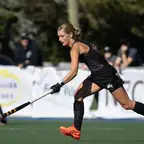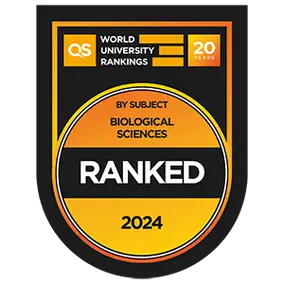Where you can study
International students
International students are not New Zealand citizens or residents.
Specialise in Exercise and Sport Science for your Bachelor of Science at Massey
Expand and apply your sports knowledge
With the Exercise and Sport Science major, you’ll study the key sport and exercise subjects including:
- biomechanics
- exercise physiology
- motor control
- sport nutrition
- sport psychology.
Complemented by a strong understanding of other biophysical sciences, you’ll gain an in-depth knowledge of factors that influence health and sports performance.
Our research-active staff will help you apply the latest knowledge to various sporting situations. You’ll gain an understanding of how to optimise athletic performance and health through technology, nutrition, psychology and exercise. Additionally, you’ll learn how training and performance are affected by different environments and the power of the mind.
Get the skills you need for a great career
You’ll learn theoretical material in lectures, and apply your new-found knowledge in laboratory or practical classes in a range of subjects relating to sport and exercise. You’ll develop critical thinking, problem-solving and communication skills relevant to this energy-fuelled and constantly progressing field. The main applications are sports performance, and the use of exercise to promote fitness and health.
You can combine exercise and sport science with other courses such as sport development, exercise prescription, or science programmes such as physiology and human nutrition.
A Bachelor of Science in Exercise and Sport Science is a good fit if you:
- have a passion for sport, exercise and health
- are fascinated by how the body moves, particularly during sport
- want to learn more about how exercise influences health and performance.
Planning information
If you study full-time, in your first year, you’ll take eight 15-credit courses, making a total of 120 credits.
If you wish to study over two semesters, you should aim for 60 credits per semester. You may be able to take some courses at summer school. Make sure you include courses that are prerequisites for the next level of courses you wish to study.
The first year structure is designed to provide you with a broad knowledge and skill set which will equip you to go on to more advanced courses in the second and third years.
You must pass at least 90 credits from the BSc Schedule A, including any compulsory courses, in your first 120 credits of study towards the Bachelor of Science.
Exercise and Sport Science has similar first year core courses to several other majors available in the Bachelor of Science, allowing students to change their major before their second year. Changing your major may incur an increase in completion time.
100-level courses
Take these in any order:
- 247113 Science and Sustainability for Science
- 161111 Applied Statistics or 161122 Statistics
- 124103 Biophysical Principles or 160101 Calculus or 160102 Algebra or 160104 Introductory Mathematics for Science or 160105 Methods of Mathematics
- 234121 Functional Anatomy.
Take these in the order shown:
Plus choose two 100-level elective courses which may be from a subject area other than Science. Recommended electives are:
- 162101 Cell Biology
- 151131 Introduction to Food and Nutrition
- 234111 Training Principles and Practice.
200-level courses in the major
- 122202 The Dynamic Cell
- 234222 Sport Biomechanics
- 234223 Exercise Physiology
- 234242 Motor Learning and Control*
*234242 is no longer offered and has been replaced with 234215 Fitness and Athletic Conditioning. Add this course using the special request function in Course Enrolment.
300-level courses in the major
- 234360 Sport Psychology
- 234327 Investigating Sports Performance
- 194348 Adaptive Human Physiology*
- 151332 Nutrition for Sport and Performance.
*194348 is no longer offered and has been replaced with 234361 Exercise Psychology. Add this course using the special request function in Course Enrolment.
Minors
Completing a minor is optional. Minors increase the breadth of your degree. They give you extra knowledge, attributes and capabilities.
A minor must be in a different subject from your major.
A Bachelor of Science (Exercise and Sport Science) with a minor
You may choose a minor from any University undergraduate degree that has recognised minors. If the minor is from another undergraduate degree, the regulations of that qualification will apply.
Some BSc minors that are particularly compatible with exercise and sport science include those shown below. Timetabling will prioritise these combinations to minimise clashes.
An Exercise and Sport Science minor (for students who are studying a different degree)
If you are not studying a Bachelor of Science (Exercise and Sport Science) and wish to complete an Exercise and Sport Science minor see the BSc regulations for the requirements.
Official regulations
To understand what you need to study and must complete to graduate read the official rules and regulations for this qualification.
You should read these together with all other relevant Statutes and Regulations of the University including the General Regulations for Undergraduate Degrees, Undergraduate Diplomas, Undergraduate Certificates, Graduate Diplomas and Graduate Certificates.
Returning students
For returning students, there may be changes to the majors and minors available and the courses you need to take. Go to the section called ‘Transitional Provisions’ in the Regulations to find out more.
In some cases the qualification or specialisation you enrolled in may no longer be taking new enrolments, so may not appear on these web pages. To find information on the regulations for these qualifications go to the Massey University Calendar.
Please contact us through the Get advice button on this page if you have any questions.
Courses you can enrol in
Course planning key
- Prerequisites
- Courses that need to be completed before moving onto a course at the next level. For example, a lot of 200-level courses have 100-level prerequisite courses.
- Corequisites
- Courses that must be completed at the same time as another course are known as corequisite courses.
- Restrictions
- Some courses are restricted against each other because their content is similar. This means you can only choose one of the offered courses to study and credit to your qualification.
Core courses for the Bachelor of Science
As well as the specialisation courses listed below, this qualification has core courses that you will need to complete.
Bachelor of Science core courses
Exercise and Sport Science courses
200-level courses
Course code: 122202 The Dynamic Cell 15 credits
Energy metabolism in higher eukaryotes from the perspective of life on earth and the necessary adaptation of living organisms from an anaerobic to aerobic environment. Carbohydrate, lipid and nitrogen metabolism in the context of health and disease. Integration and regulation of carbohydrate, lipid and amino acid metabolism. A lecture and problem-based tutorial course complemented by a hands-on project-based laboratory course.
View full course detailsCourse code: 234222 Sport Biomechanics 15 credits
An introduction to the study of the kinematics and dynamics of the human body and the factors that influence skilful and efficient performance of bodily movements in sport and everyday life. Students will be introduced to the techniques and methods required for qualitative analysis of complex skills.
View full course detailsCourse code: 234223 Exercise Physiology 15 credits
A study of the function of human biological systems as they relate to sport and exercise. Acute responses and the chronic adaptations to sport and exercise, specifically in relation to the core topics of human energetics, muscular, cardiovascular and respiratory systems. A strong laboratory focus will reinforce the theory and develop laboratory skills relevant to exercise physiology.
View full course detailsCourse code: 234242 Motor Learning and Control 15 credits
Students will study the principles and theories of motor control and their practical applications.
View full course details300-level courses
Course code: 151332 Nutrition for Sport and Performance 15 credits
Nutritional aspects of exercise physiology and metabolism. Nutritional principles for enhancing performance in recreational and elite athletes Food and nutrition for specific sporting codes and specific groups (e.g. children, adolescent athletes, female athletes, elite athletes). Assessment of nutritional status of athletes.
View full course detailsCourse code: 194348 Adaptive Human Physiology 15 credits
An integrative study of the human physiological responses and adaptations to internal and external environmental stressors that challenge the normal homeostatic state and how these influence human health and performance.
View full course detailsCourse code: 234327 Investigating Sports Performance 15 credits
An introduction to research methods in sport and exercise including the research process, formulating a research question, data collection, analysis, and dissemination. Students will develop and undertake a project related to their area of interest within sports performance.
View full course detailsCourse code: 234360 Sport Psychology 15 credits
This course examines theory, research and practice in aspects of sport psychology.
View full course detailsEntry requirements
Admission to Massey
All students must meet university entrance requirements to be admitted to the University.
Specific requirements
There are no specific entry requirements for this qualification, outside of university admission regulations. However there is some expected background knowledge.
Expected high school preparation
Knowledge gained in the following NCEA subjects (or the equivalent in Cambridge International Examinations, International Baccalaureate, or similar) will give you the expected background knowledge to take this major.
- At least 14 credits in NCEA Level 3 Biology.
- At least 14 credits in NCEA Level 3 Chemistry.
If it’s some time since you studied mathematics at school you can find out if you have the required background by taking this maths quiz.
English language requirements
To study this qualification you must meet Massey University's English language standards.
English language skills
If you need help with your English language skills before you start university, see our English for Academic Purposes (EAP) courses.
Can't meet the entry requirements?
Haven’t studied the right subjects at high school?
The following pathways will get you prepared to study this major. If you have not studied NCEA Level 3 Biology (or equivalent) take the following course first:
- 162103 Introductory Biology.
If you have not studied NCEA Level 3 Chemistry (or equivalent) take the following course first:
- 123103 Chemistry for Modern Sciences.
These courses are available in the summer semester and will count towards credits in your degree.
If you need to do a course before you start your qualification, there may be options for you in Summer School.
Fees and scholarships
Fees, student loans and free fees scheme
Your tuition fees may be different depending on the courses you choose. Your exact fees will show once you have chosen your courses.
There will also be some compulsory non-tuition fees and for some courses, there may also be charges for things such as study resources, software, trips and contact workshops.
- Get an estimate of the tuition fees for your qualification
- View a list of non-tuition fees that may be payable
Already know which courses you're going to choose?
You can view fees for the courses that make up your qualification on the course details pages.
Student loans (StudyLink) and Fees Free scheme
You may be eligible for a student loan to help towards paying your fees.
The New Zealand Government offers fees-free tertiary study for eligible domestic students. Find out more about the scheme and your eligibility on the Fees Free website. To use the site's eligibility checking tool, you will need your National Student Number.
Current and returning Massey students can find their National Student Number in the student portal.
- Student loans (StudyLink)
- Fees Free
- Student portal
Scholarship and award opportunities
Search our scholarships and awardsFees disclaimer
This information is for estimation purposes only. Actual fees payable will be finalised on confirmation of enrolment. Unless otherwise stated, all fees shown are quoted in New Zealand dollars and include Goods and Services Tax, if any. Before relying on any information on these pages you should also read the University's Disclaimer Notice.
Careers and job opportunities
Massey’s exercise and sports science graduates have an excellent reputation throughout the sporting industry and are sought-after in a wide range of areas including sports, fitness and health.
Some examples are:
- sport scientist working with individual athletes, sports teams, sports coaches and regional sporting bodies
- providing exercise and health guidelines to clients
- providing occupational health advice to companies and local bodies
- teaching at secondary and tertiary level.
International students
New Zealand is a great place to study. Massey University’s reputation is supported by our international rankings, accreditations and associations. We are rated five star plus by the QS World University Rankings.
Massey University has small class sizes, and our lecturers and staff are friendly and approachable.
As an international student, there are entry requirements that will apply to you. We recommend that you apply at least three months before your anticipated start date so your application can be processed in time. There are additional steps you will need to take. These include obtaining a visa and travel bookings if your study is to be in New Zealand.
What our students say
“I’m grateful to be able to play hockey and study at the same time. Massey is so efficient and supportive with online learning. Despite being a busy workload, Massey provides the flexibility I need. I have the opportunity to set up my future by working towards a degree without having to wait.”

Ngāi Te Rangi
“I have really enjoyed studying at Massey and the Sport Science staff have always been extremely supportive throughout my time here. Massey has also presented many opportunities for internships and work experience which have proved to be invaluable learning experiences for me.”

Accreditations and rankings
Related study options
Exercise Prescription – Bachelor of Sport and Exercise
Massey’s Bachelor of Sport and Exercise (Exercise Prescription) will give you the knowledge and skills to develop, implement and assess exercise programmes to enhance sport performance, health, and rehabilitation.
Useful planning information

Key information for students
Compare qualifications and academic information across different New Zealand institutions. Learn more on careers.govt.nz
